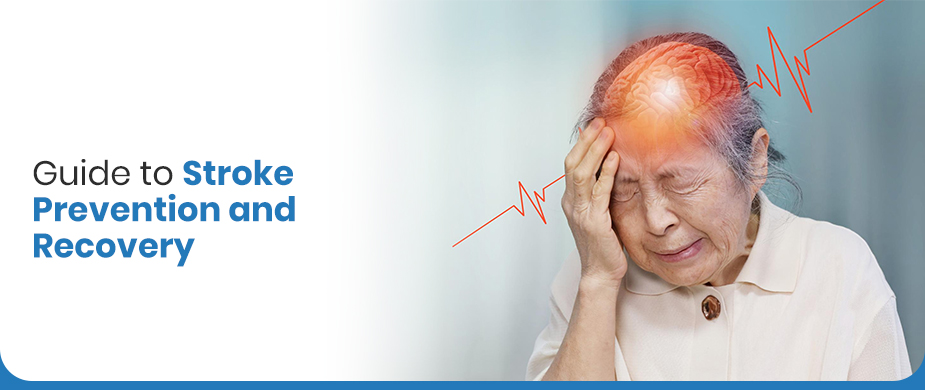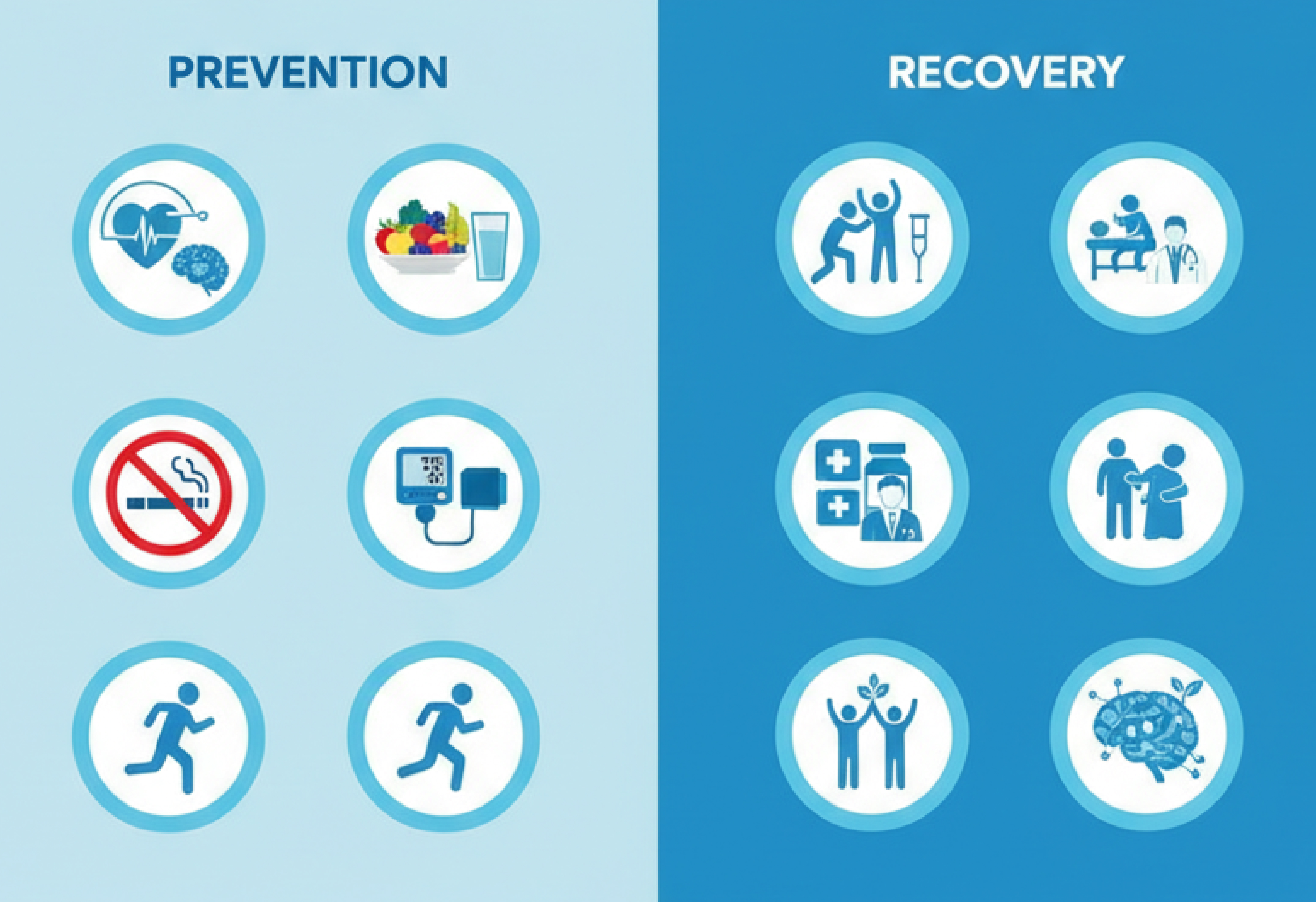
Book an Appointment
Call Us01140846835Guide to Stroke Prevention and Recovery
A stroke can cause several complications, such as brain swelling, trouble speaking, memory loss, movement issues, and dysphagia (trouble swallowing). These issues can significantly affect a person's quality of life. And they can become harder to manage without timely professional care. That’s why early stroke prevention or intervention is so important.
Managing risk factors such as high blood pressure, diabetes, and lifestyle habits can help reduce your chances of a stroke. However, if it does happen, getting expert medical support immediately makes all the difference.
Personalized care like at IBS is the key to stroke recovery. Advanced stroke management and personalized rehabilitation plans to help you regain mobility, speech, and independence.
Health Note: If you experience frequent shaking, speaking, and swallowing issues, it’s important to seek medical advice from a licensed healthcare professional. This blog is for educational purposes to help you understand stroke prevention and recovery. It is not intended to replace professional advice.

How to Prevent a Stroke
A stroke happens when blood flow to a part of the brain is abruptly blocked or a blood vessel bursts. This stops oxygen from reaching brain cells and without oxygen, these cells start to die within minutes. This damage can disrupt how an individual moves, speaks, sees, or thinks. The stroke symptoms vary depending on which part of the brain is damaged.
That's why it is crucial to prevent stroke in the first place. Some of the stroke prevention tips are:
1. Control High Blood Pressure (B.P)
Managing B.P. below 130/80 mm Hg lowers blood vessel damage and stroke risk.
2. Follow a Healthy Diet
Eating fruits, vegetables, whole grains, and lean proteins reduces bad cholesterol and inflammation, lowering the risk of stroke.
3. No Sedentary Lifestyle
Regular exercise keeps your heart and blood circulation healthy, controls weight, and lowers blood pressure to prevent stroke chances.
4. Avoid Smoking
Quitting smoking lowers blood vessel damage and clot formation, reducing stroke risk.
5. Manage Sugar Levels
Controlling blood sugar level means preventing artery damage linked to stroke.
6. Maintain a Healthy Weight
A healthy weight reduces strain on the heart and blood vessels, preventing stroke.
7. Limit Alcohol Consumption
Moderate drinking prevents blood pressure spikes and blood vessel damage linked to stroke.
8. Reduce Cholesterol
Lowering bad cholesterol prevents artery blockages that cause stroke.
However, if it happens, then you need stroke recovery strategies under professional guidance at the IBS hospital.
Stroke Recovery Strategies at IBS Hospital
The comprehensive stroke care at IBS Hospital offers faster recovery, helping you achieve a more independent life:
Here are the comprehensive stroke recovery strategies:
1. Stroke Rehabilitation Exercises
IBS helps perform simple exercises like:
- Calf stretches
- Mini squats
These help improve muscle strength, joint mobility, and balance, helping you regain daily essential movement skills.
2. Technology-Assisted Physical Activities
Devices at IBS, such as:
- Robotic arms
- Virtual reality tools
They aid in active and passive movement and trigger brain rewiring and improved coordination.
3. Cognitive and Emotional Activities
Tasks like:
- Memory games
- Sudoku or crossword puzzles
- Interactive computer games
- Board games
Support mental function recovery and emotional well-being, encouraging overall brain healing.
4. Noninvasive Brain Stimulation
Techniques such as transcranial magnetic stimulation stimulate brain plasticity, helping in the recovery of lost functions without surgical risk.
The Latest Technology at IBS are:
- Cyberdyne Hybrid Assistive Limb (HAL)
- Non-invasive sensors
- The Pablo system
- Tymo, a versatile rehabilitation
- Luna EMG technology
IBS Modern Stroke Rehabilitation Strategies Differ From Traditional Ways
IBS’s stroke recovery strategies offer the following advances:
- They are based on neuroplasticity (the brain's ability to reorganize and rewire its neural connections) and neuromodulation (the targeting of the nervous system).
- Real-time monitoring of muscle activity.
- They translate bioelectrical signals into accurate voluntary movements so that patients perform desired actions with confidence.
- They provide detailed electromyography assessments for the deeper analysis of muscle activity and nerve function.
When Should Stroke Rehabilitation Begin?
The best hospital or clinic will start stroke rehabilitation as soon as 24 to 48 hours after your stroke. However, the intensity and timing may be tailored based on the type and severity of stroke for the maximum benefits
How Long Does Stroke Rehabilitation Last?
Stroke rehabilitation generally lasts several months, with the optimum recovery happening within the first 3 to 6 months. During this phase, the brain's plasticity is at its peak, resulting in significant improvements in motor and cognitive functions. Many studies suggest that more intensive motor rehabilitation should be given to stroke patients at 60 to 90 days after stroke onset.
When to See a Doctor
You should immediately see a doctor if you observe the following symptoms:
- B - Balance: Trouble walking and balancing.
- E - Eyes: Change in vision.
- F - Face: One-sided facial drooping happens while smiling.
- A - Arms: When lifting both arms, one drifts toward the ground.
- S - Speech: Slurred speech or unable to understand what others are saying.
- T - Time: If you notice any of these signs, dial the emergency healthcare number right away, as every second counts.
Conclusion
Stroke recovery may take time, but you have to be patient. With expert guidance at IBS and personalized rehabilitation, the journey becomes less challenging, increasing your chances of regaining independence and improving quality of life. Early stroke recovery intervention, continuous support, and advanced therapies at IBS Hospital make a significant difference.
According to the National Institutes of Health (NIH) and the Mayo Clinic, early intervention in stroke medical treatment, ideally within 24 to 48 hours, is important for improving outcomes. Patient can gain significant improvement in their symptoms with proper rehabilitation techniques
About IBS Hospital
This article was prepared by the IBS Hospital Neurology and Rehabilitation Team, a trusted healthcare provider with over 15 years of experience in diagnosing and managing neurological conditions. Every article is medically reviewed to ensure reliability and clinical accuracy.
 By -Dr Aaksha Shukla |
October 24, 2025 | 9 Min Read
By -Dr Aaksha Shukla |
October 24, 2025 | 9 Min Read
Brain Tumor Surgery Hospital – Cost & Best Surgeons
Epilepsy Treatment & Surgery Hospital
Parkinson’s Disease Treatment Hospital in India
Brain Stroke Treatment Hospital – Emergency Care
Stroke Paralysis Treatment Hospital – Advanced Neuro Care
Paralysis Treatment Hospital in India – Cost & Recovery
Brain Infection Symptoms, Causes, and When to Seek Emergency Care
Is Spine Surgery Right for You? Here’s How to Know
Brain Health at Every Age: Preventive Neurology Tips
International Patient Guide: Visiting India for Neuro & Spine Treatments
Robot-Assisted & Navigation-Guided Surgery: Safer Brain & Spine Procedures
Sports Injury Recovery: How Arthroscopy Helps You Heal Faster?
How Deep Brain Stimulation (DBS) Helps in Parkinson’s & Tremor Control
Early Warning Signs of a Brain Tumour & When to See a Neurosurgeon
Signs of a Stroke: When to Seek Emergency Neuro Care
Best Neurosurgery Hospitals in Delhi NCR: A Detailed Guide
Minimally Invasive Spine Surgery: Benefits, Cost & Recovery
Best Tips for Sports Injury Recovery

